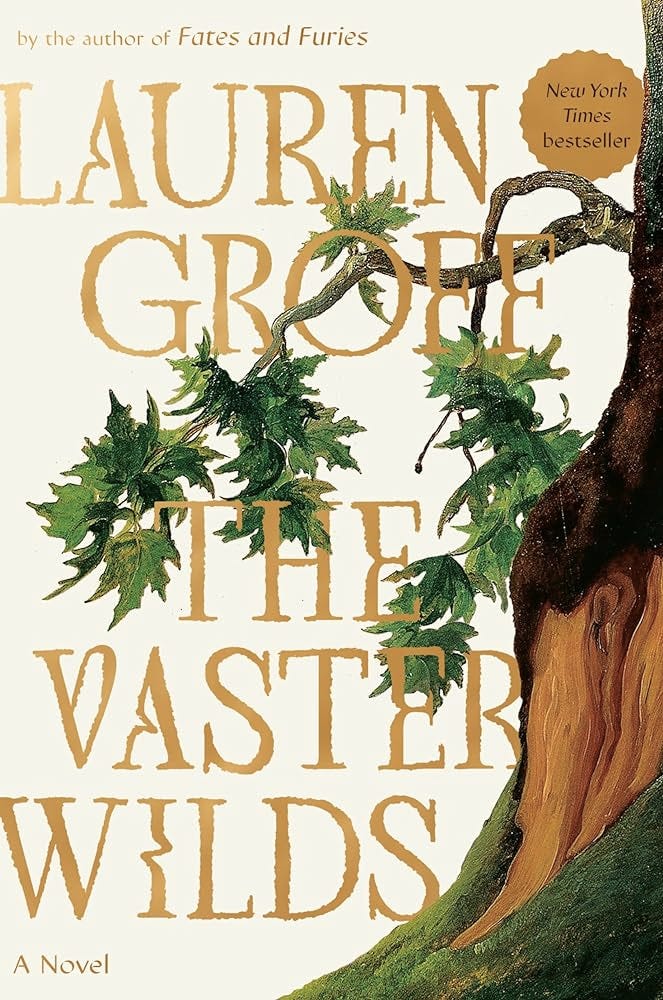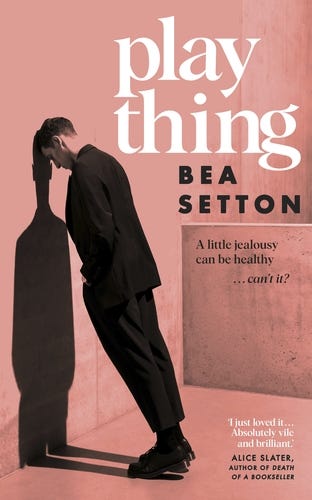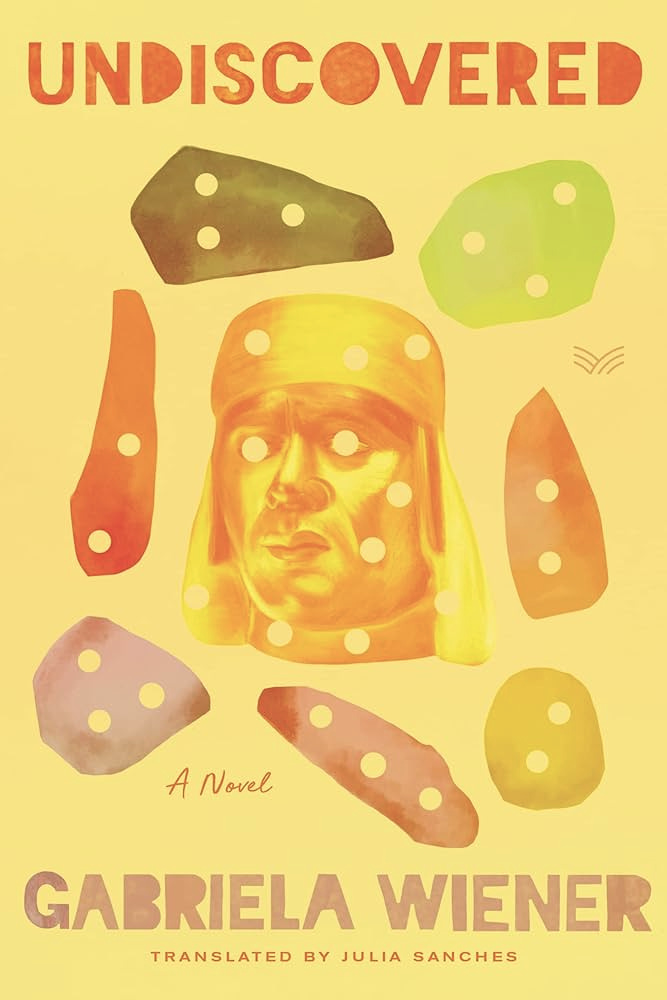Books I’ve read this year so far, part 1
The Vaster Wilds by Lauren Groff
I thought this was good! I thought the ending (very Last Temptation of Christ-esque) was particularly well done. Groff can really write – she is basically a full-time writer who reads 300 books a year, from what I gleaned from this profile (her husband “owns and operates off-campus housing for University of Florida students”). I thought there were moments here and there where the character read a bit like a mouthpiece for 21st-century ideas, but you can’t deny that this is very well written.
Berlin by Bea Setton
I thought this was fantastic. Dark, funny, witty, and incredibly readable. Definitely one of the best 1st-person narrators I’ve read in recent years. I’ve recommended this book to people a lot. Great evocation of place and terrific use of tension throughout. I really liked the unreliability of the narrator, the way she would backtrack and lie. Just really damn entertaining.
My Dead Parents: A Memoir by Anya Yurchyshyn
Great memoir and incredibly sad story. Read this as per recommendation of my sister. This would be a good book to read alongside I’m Glad My Mom Died (another one of the best memoirs I’ve read in recent years).
“I stopped thinking of my parents as my parents, and began seeing them simply as people.”
“No kids or marriage meant I’d experienced none of the sacrifices, joys, and deep vulnerabilities that accompany each. I’d done many hard things, but I’d never tried to do what they’d done.”
“It’s hard for children to know their parents, and hard for parents to be themselves around their kids.”
“You can adore your children and your time with them but still resist the expectation that you’ve been changed so dramatically by motherhood that you no longer care about the things you once did, or that your previous life should be over.”
Wild Houses by Colin Barrett
Glad to see this nominated for the Booker! I think Barrett is one of the best writers out there in terms of the sentence level and it’s good to see him getting ‘mainstream’ recognition of this. I thought the way this book wrote about sadness and hopelessness was really well done. Also the way he writes about male mental health. The image of the football stuck in the hedge slowly deflating for years is SO evocative. I love the anecdote Barrett told in a recent interview, about a reader from China who told him, “I grew up in a town exactly like this.” What a testament to the power of literature and specificity!
“He was back where he always seemed to end up. His life, circling, tighter and tighter, in on itself. It was as if ever time he tried to move off, however tentatively, in a new direction, he was wrenched right back to the centre of himself. And that centre was getting smaller and smaller, more decrepit and ferociously reduced.”
“Believe it or not, I know what I’m like… Every so often, it dawns on me, in cold horror.”
“The slow, inexorable approach of the shapeless, prospectless days to come, days where there would be no need to get out of bed or brush his teeth or talk to anyone at all, days that would, in time, become unbearable too.”
“His thoughts, unsolicited, unarticulated and stacking feverishly up inside his mind, began to feed on themselves, like penned rats.”
“She watched the dark. It felt like the dark was watching back.”
The Ministry of Time by Kailiane Bradley
This wasn’t for me in terms of my personal reading habits/taste, but it’s been great to see Bradley experiencing so much success with this, particularly with the recent Barack Obama pick. I really liked the parallel between time travellers and refugees / immigrants (particularly pertinent with everything going on in the UK at the moment), and I liked all the moments that engaged seriously with the legacy of the British Empire.
(But Barack, the real question is, why did you pick “365” over “360”?? THE PUBLIC MUST KNOW!!)
Tidal Waters by Velia Vidal
An interesting and very short book narrated as letters. This is a weird thing for me to say, as I usually love short books, but I almost felt like this was too short? Great to see Vidal translated into English. She gave a great talk alongside Pilar Quintana (The Bitch writer) for the British Museum/Hay Festival last year; I think the work they’ve been doing is SUPER interesting.
Life and Fate by Vasily Grossman
Holy God, what an achievement it was to finish this book after Stalingraad! I keep referring back to this book all year (“it’s just like Life and Fate“) so it clearly left an impression on me. So I’m glad I read these two books, definitely a towering achievement of my “reading career”. The sequence in the concentration camp is one of the best pieces of writing I’ve ever read in my life. They don’t make ’em like this anymore. I need to find another Russian classic to tackle!
Purple Hibiscus by Chimamanda Ngozi Adichie
I thought this was REALLY good and I agree with my sister that this would be a great book to assign in high schools. I wonder if Adichie will write another novel / if she is working on one? If not who cares, it’s a marathon, not a race, let her take as long as she wants or if she doesn’t want to write fiction anymore that’s fine too. But I do wonder/worry sometimes about writers who just get SO famous… I can’t help but imagine/project that it seems incredibly psychologically debilitating! The freaking pressure, and constant critique (no wonder they’ve all left social media – who needs it?). And it’s ALWAYS towards women artists (see Billie Eilish etc). Anyway, I digress. I really liked the way the father and his abuse in this novel stood in as a metaphor for colonialism / forces beyond our control trying to shape our lives, forcing us to be as they want us to be. In this sense the ending was a really powerful metaphor. I also thought the book was really fair in showing how the father had been twisted/corrupted, i.e. he wasn’t just a super evil villain.
James by Percival Everett
Also good to see this nominated for Booker. Another book that would be good to have taught in high schools along Huck Finn (which I don’t believe should be banned from reading lists, but rather engaged with). I really liked the parts which broke away from scenes in Huck Finn (basically when James is able to break away from Twain’s narrative and have his own adventures) and I REALLY liked the twist at the end – really intelligent move on Everett’s part. This book reminded me of Kindred and Parable of the Talents, via the different set-pieces/scenes that evoke how brutal life was for slaves (especially the sawmill section). Definitely a writer I want to read more of.
Play Thing by Bea Setton
Probably one of my favourite books this year – I couldn’t put it down! Wonderful use of suspense and tension; it made me feel absolutely sick (which I love). Loved the fucked up dark ending and the use of humour throughout. I really like books that are both substantial (i.e. engaging with deep themes / being well controlled and deliberate with language and form) while also being entertaining and gripping on the level of storytelling. This may look easy to pull off… but it’s definitely not!
“If this was a woman, what was I? What did they make of me, with my big nose, my lack of grace?”
“I spent my spare time googling ‘how to give better blow jobs’ and ‘aphrodisiac dinners for two on a budget’.”
“I wasn’t sure how I felt about being classified as the female equivalent of a succulent… what was Caden’s ex? A beautiful hot house orchid? Something complicated and delicate. But I supposed it was better than seeming needy and demanding.”
[After watching her boyfriend’s football match and sitting in the pub with all the other girlfriends] “I couldn’t imagine these men watching women perform some amateur sport for hours on end. Unless it was amateur pornography.”
“Going through a person’s devices is probably the closest you’ll ever come to being inside their mind.”
Paradais by Fernanda Melchor
This is dark and NOT for the faint of heart. Faulkner-esque in terms of its long sentences, Bolaño-esque in terms of the voice. This book made me feel pretty awful (esp. about the human race), but it is basically capturing the accurate reality of a hopelessly misogynistic mindset. My god, it ain’t pretty. This would be an interesting book to teach in a crime classroom, but it would definitely be tough….
The Bell Jar by Sylvia Plath [reread]
After reading Play Thing I wanted to read more 1st-person novels and this obviously is a classic. I don’t think I’ve read this since high school? Not sure if ‘fun’ is the best word to use… It’s definitely a weird novel – very jagged and jumpy, but that makes it very unique. Naturally it’s filled with just brilliant sentences. I think my favourite chapter/sequence is when she first arrives home and learns she hasn’t gotten a place on the creative writing course, and tries writing a novel herself. This is definitely a book that every woman should read. The famous ‘fig tree’ passage is probably one of the best pieces of writing ever done in the history of literature (yes, I stand by this!).
Day Zero by C. Robert Cargill
My ‘bedtime’ read (i.e. the book I read before falling asleep at night). Pretty silly, but also enjoyable. I thought the relationship between the A.I. tiger robot and the little boy was nicely poignant. How can you not love a robot nanny tiger as a main character? I also liked how the book wasn’t afraid to be dark – the ending is pleasingly a bit of a bummer. I’ve been reading Sea of Rust on and off all year (the sequel, though in terms of publishing schedules it came first) and Day Zero is definitely better…
Undiscovered by Gabriel Wiener
“At this point I always start imagining how my life would be different if I were actually related to the man who had ‘discovered’ one of the New Seven Wonders of the World, though we all know what it means to discover America and things that have been there all along. Would I have a house with a pool?”
This will probably be one of my top reads of the year. I thought it was REALLY interesting. It’s basically a memoir, i.e. autofiction, about a Peruvian journalist/writer called Gabriela Wiener who is investigating whether or not she is truly descended from Charles Wiener, an Austrian-French explorer who brought back who came close to discovered Machu Picchu and brought back (i.e. stole) a bunch of artefacts to France. This would be a good book club pick. I really liked the parts where she close-read Wiener’s writings and thought about what the two of them had in common as writers. I found the part where she starts attending a group called Decolonizing My Desire both funny and touching. The tone of the book throughout is curious, investigative, and thoughtful.
Overall, I thought this was really well told – I really enjoy reading about people’s families, and that sense of shame and fascination that comes to looking at a legacy, which then ties into the question of who you are today.
We the Animals by Justin Torres
Reading Undiscovered made me want to read another memoir-esque book about families, so I read this one, which had been on my TBR list for years. Short and forceful, almost like a work of poetry. Incredibly well controlled. You can really tell he relentlessly edited the shit out of this (I always admire writers with this kind of capacity / patience / discipline haha). Strikingly bleak and sad ending. This would be another good book for mature high schoolers.
All Fours by Miranda July
I had some critiques of this, but it’s a book that everyone else seems to love, so it is likely very much a ‘me’ problem. Basically, the stuff that I usually love and appreciate about July’s work (her wonderful imagination and her ability to make me see the world ‘anew’ and ‘afresh’) wasn’t present for me in this. I also didn’t like the main narrative thread of the book, and how so much of it was conditioned/made possible by the narrator’s strong financial position, which was never acknowledged/engaged with in a way I found satisfying. Believe me, I am the LAST person in the world to criticise a novel for being about well-off people (I love Rachel Cusk, she wails helplessly), but if your empowerment plot is dependent on affording a gym membership, babysitters, owning a house in L.A. valued at over a million dollars… I thought this was a serious oversight on the book’s part, and overall I think July’s skills are better suited for more ‘fictional’ novels, with a more imaginative surreal approach (like her short stories or The First Bad Man, which I loved) rather than an autofictional one. Reading this was a good reminder for me of why I don’t like reading ‘current’ or ‘trendy’ novels – my reading inevitably gets coloured by the press/hype surrounding them. I waited a few years to read Brandon Taylor and Jenny Offhil for example and I’m really glad I did. Lesson learned: wait 3-5 years to read these kinds of books so that you’re approaching them with a clear head!
Tell Me Everything by Elizabeth Strout
Another good strong comforting read – Strout is a true master. She is kind of doing the same thing over and over at this point but so does Anne Tyler, one of my all-time favourite writers. (And so did Bolaño, and Murakami, etc.) It’s good to see Olive and Lucy finally meet in this – I did find their “let’s meet up and tell each other stories” thing a little contrived and too novelistic but whatever, I’m just a Picky Patty. Will Strout’s next book move away from them…? Or are they kind of inevitable box-ticking at this point? Well, who cares, amirite? My favourite character in this was Pam – I would love to see Strout return to the theme of addiction. I also really liked the theme of how we remember things differently, and how we might never know what ‘really’ happened.
Prince Caspian and The Lion, the Witch and the Wardrobe by C.S. Lewis
Sometimes you just wanna reread a childhood fav! It’s nuts to me how many student essays / personal statements I read where people are like “these books were a huge influence on me, they made me want to write/study literature.” Reading this as an aging millenial, I found the opening sequence of Prince Caspian, of returning to a place once important to you now in ruins, incredibly poignant and affecting. If you think about it too hard there is something really fucked up and Inception-esque about the fact that they lived lives as adults and then had to return to being children!!! Almost like a horror story!!
The Goblin Emperor by Katherine Addison
After re-reading Narnia I wanted to read another fantasy novel so chose this one as my ‘bedtime’ book – that was perhaps a mistake as this is quite a complex book and not the best thing to read if you are feeling kind of sleepy and stupid. But this is a very well written and intelligent fantasy novel, and one that I would definitely recommend to students. I liked the Hilary Mantel-esque level of political intrigue. Interesting that the writer has a background in Renaissance Drama! (See, I would say to my students, studying literature IS useful. Lol). I was however consistently frustrated by the character/glossary list in this – If you’re going to have a glossary of people, places, and names… ALL OF THE PEOPLE have to be in there (see A Place of Greater Safety). It was EXTREMELY frustrating to flip back to the list to check someone’s identity, only to see that they weren’t there.
Liars by Sarah Manguso
This book seems to have sparked some debate what with the recent New Yorker review, which I personally thought was a bit unfair. I thought this was an INCREDIBLY compulsive read, and a big achievement on the writer’s part. Fuck that shitty ass guy! He was worse than the dude in Soldier Sailor, and my God that’s saying a lot.
The Coin by Yasmin Zaher
Another book I’ve been consistently recommending to people all year. This will also likely be one of my top picks of 2024. I thought the first person voice was incredible. Everything about this to me (plot, voice, structure) was just remarkable, especially how weird and fucked up the ending gets. This should 100% get taught in a 21st-century literature class. Definitely the kind of book that should get Massive with the Youth on the TikTok.
To be continued!























